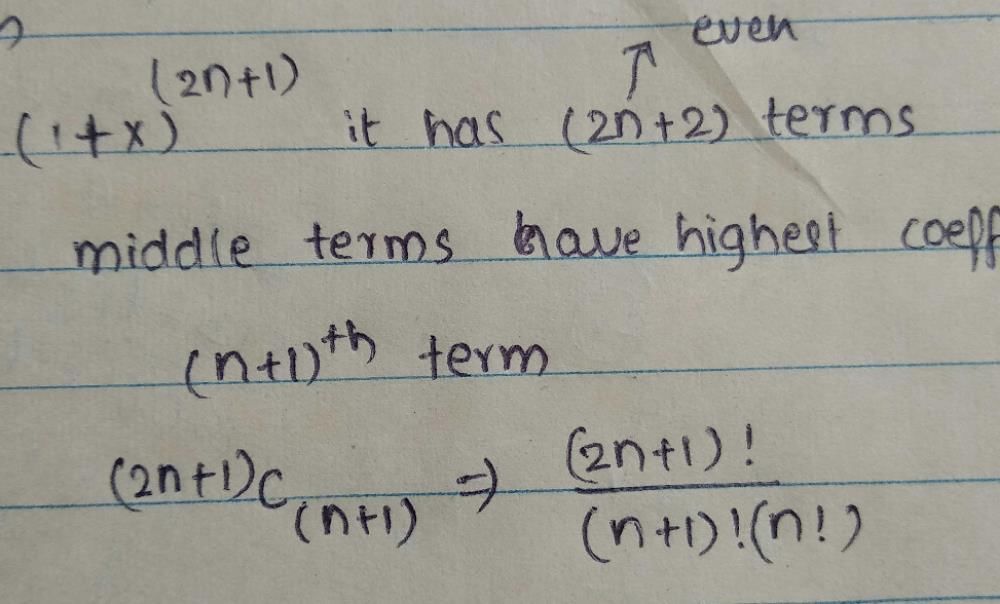JEE Exam > JEE Questions > The greatest coefficient in the expansion of ...
Start Learning for Free
The greatest coefficient in the expansion of (1+x)^(2n+1) is?
Most Upvoted Answer
The greatest coefficient in the expansion of (1+x)^(2n+1) is?

Community Answer
The greatest coefficient in the expansion of (1+x)^(2n+1) is?
The greatest coefficient in the expansion of (1+x)^(2n+1)
To find the greatest coefficient in the expansion of (1+x)^(2n+1), we need to understand the binomial theorem and the concept of binomial coefficients.
Binomial Theorem:
The binomial theorem states that for any positive integer n, the expansion of (a+b)^n can be written as the sum of the terms of the form C(n,k) * (a^k) * (b^(n-k)), where C(n,k) represents the binomial coefficient.
Binomial Coefficient:
The binomial coefficient C(n,k) represents the number of ways to choose k items from a set of n distinct items. It can be calculated using the formula C(n,k) = n! / (k! * (n-k)!), where n! denotes the factorial of n.
Expanding (1+x)^(2n+1):
In this case, we have (1+x)^(2n+1), which can be expanded using the binomial theorem. The expansion will consist of (2n+2) terms, as the power of (1+x) is (2n+1).
The general term in the expansion will be of the form C(2n+1,k) * (1^k) * (x^(2n+1-k)). Note that the coefficient of x in each term is 1^k, which is always 1. Therefore, to find the greatest coefficient, we need to find the term with the greatest binomial coefficient C(2n+1,k).
Finding the greatest coefficient:
To find the greatest coefficient, we need to determine the value of k that maximizes the binomial coefficient C(2n+1,k).
Key Points:
1. The binomial coefficient C(2n+1,k) is symmetric, meaning C(2n+1,k) = C(2n+1,2n+1-k). Therefore, we only need to consider values of k up to (2n+1)/2.
2. The binomial coefficient C(2n+1,k) is maximized when k is closest to (2n+1)/2. This can be intuitively understood by considering the symmetry of the coefficients.
3. Therefore, the greatest coefficient in the expansion of (1+x)^(2n+1) is C(2n+1,(2n+1)/2).
Conclusion:
In conclusion, the greatest coefficient in the expansion of (1+x)^(2n+1) is given by the binomial coefficient C(2n+1,(2n+1)/2). This coefficient can be calculated using the formula C(2n+1,k) = (2n+1)! / (((2n+1)/2)! * ((2n+1)-(2n+1)/2)!).
To find the greatest coefficient in the expansion of (1+x)^(2n+1), we need to understand the binomial theorem and the concept of binomial coefficients.
Binomial Theorem:
The binomial theorem states that for any positive integer n, the expansion of (a+b)^n can be written as the sum of the terms of the form C(n,k) * (a^k) * (b^(n-k)), where C(n,k) represents the binomial coefficient.
Binomial Coefficient:
The binomial coefficient C(n,k) represents the number of ways to choose k items from a set of n distinct items. It can be calculated using the formula C(n,k) = n! / (k! * (n-k)!), where n! denotes the factorial of n.
Expanding (1+x)^(2n+1):
In this case, we have (1+x)^(2n+1), which can be expanded using the binomial theorem. The expansion will consist of (2n+2) terms, as the power of (1+x) is (2n+1).
The general term in the expansion will be of the form C(2n+1,k) * (1^k) * (x^(2n+1-k)). Note that the coefficient of x in each term is 1^k, which is always 1. Therefore, to find the greatest coefficient, we need to find the term with the greatest binomial coefficient C(2n+1,k).
Finding the greatest coefficient:
To find the greatest coefficient, we need to determine the value of k that maximizes the binomial coefficient C(2n+1,k).
Key Points:
1. The binomial coefficient C(2n+1,k) is symmetric, meaning C(2n+1,k) = C(2n+1,2n+1-k). Therefore, we only need to consider values of k up to (2n+1)/2.
2. The binomial coefficient C(2n+1,k) is maximized when k is closest to (2n+1)/2. This can be intuitively understood by considering the symmetry of the coefficients.
3. Therefore, the greatest coefficient in the expansion of (1+x)^(2n+1) is C(2n+1,(2n+1)/2).
Conclusion:
In conclusion, the greatest coefficient in the expansion of (1+x)^(2n+1) is given by the binomial coefficient C(2n+1,(2n+1)/2). This coefficient can be calculated using the formula C(2n+1,k) = (2n+1)! / (((2n+1)/2)! * ((2n+1)-(2n+1)/2)!).

|
Explore Courses for JEE exam
|

|
Question Description
The greatest coefficient in the expansion of (1+x)^(2n+1) is? for JEE 2025 is part of JEE preparation. The Question and answers have been prepared according to the JEE exam syllabus. Information about The greatest coefficient in the expansion of (1+x)^(2n+1) is? covers all topics & solutions for JEE 2025 Exam. Find important definitions, questions, meanings, examples, exercises and tests below for The greatest coefficient in the expansion of (1+x)^(2n+1) is?.
The greatest coefficient in the expansion of (1+x)^(2n+1) is? for JEE 2025 is part of JEE preparation. The Question and answers have been prepared according to the JEE exam syllabus. Information about The greatest coefficient in the expansion of (1+x)^(2n+1) is? covers all topics & solutions for JEE 2025 Exam. Find important definitions, questions, meanings, examples, exercises and tests below for The greatest coefficient in the expansion of (1+x)^(2n+1) is?.
Solutions for The greatest coefficient in the expansion of (1+x)^(2n+1) is? in English & in Hindi are available as part of our courses for JEE.
Download more important topics, notes, lectures and mock test series for JEE Exam by signing up for free.
Here you can find the meaning of The greatest coefficient in the expansion of (1+x)^(2n+1) is? defined & explained in the simplest way possible. Besides giving the explanation of
The greatest coefficient in the expansion of (1+x)^(2n+1) is?, a detailed solution for The greatest coefficient in the expansion of (1+x)^(2n+1) is? has been provided alongside types of The greatest coefficient in the expansion of (1+x)^(2n+1) is? theory, EduRev gives you an
ample number of questions to practice The greatest coefficient in the expansion of (1+x)^(2n+1) is? tests, examples and also practice JEE tests.

|
Explore Courses for JEE exam
|

|
Signup for Free!
Signup to see your scores go up within 7 days! Learn & Practice with 1000+ FREE Notes, Videos & Tests.


















